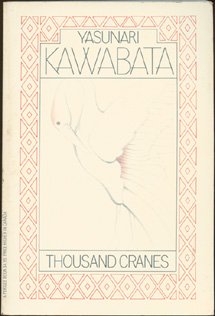Thousand Cranes
by Yasunari Kawabata
A Review by Scott finished Nov. 10, 2012
In one sentence: Thousand Cranes is a beautiful and evocative book.
This review will contain spoilers!
In many sentences:
This is the third book by Kawabata I have read, and probably my favorite so far, though I should probably read Snow Country again before I say such a thing. Despite the rapid pace, and simple style of Thousand Cranes, there is an intensity and weight to every moment that makes it a very powerful book to read. Each line of dialogue, each description seems strikingly important, perhaps precisely because there is so little descriptive text.
No moment exemplifies this intensity quite as well as the scene near the end where Kikuji and Fumiko are examining the two tea bowls, evaluating their quality because Fumiko wishes to destroy the one she gave to Kikuji, as she does not believe it is fine enough to have been given. In that moment, they look upon the bowls and the history of the affair between Kikuji's father and Fumiko's mother fills the air. You can practically feel the tension between the two characters as they look at the bowls, and attempt to resist the temptation of the moment (something that the bowls themselves symbolize was not resisted in the past). I cannot articulate this nearly as well as it deserves, but the moment is intense and all the more impressive because of the sparse language that Kawabata uses.
This book was also an interesting read for me because of its place in the Japanese literature that I have read. Kikuji as a character, and in the events that happen to him, seems to be the perfect nexus of other Japanese books I have read. First of all, his initial confusion, innocence, and simultaneous obsession over women is strikingly similar to that of Sanshirō (from Sōseki's Sanshirō). His affairs, the prevalence of ceremony, and the way "ghosts" and the dead appear to stick around is so reminiscent of Murasaki's Genji. Finally, the dreamlike quality of sex, and relationship with the older woman bear a strong resemblance to Murakami's Kafka on the Shore.
Now, it's entirely possible this is all just a coincidence, and I'm merely seeing the connections between the Japanese literature I have read, and that I would have seen different connections had I read different books in the past. And yet, I can't help but wonder if by a strange coincidence, I have read the perfect combination of books, and in such an order as to see these real inspirations (both for Kawabata in Murasaki and Sōseki and by Kawabata in the case of Murakami). I think this is likely, even, because isn't it possible that the Japanese literature that does get translated is the best? Thus making it the works that inspire the later generations the most? That isn't to say that there aren't other inspirations, and other references being made that I'm not seeing, but wouldn't it be likely that I would see the ones that are there because they are referring back to the best of the Japanese literature available in English?
Another possibility is that, while there are other "lines of inspiration" that occur in Japanese literature, the one that speaks the most to Western readers, and therefore the one that is translated and made readily available in English, is the path that I have seen in my own reading? This, of course, begs the question of whether or not similar translation-selection situations occur with other languages? For example, does the Russian literature we see in English follow a certain literary evolution that is more easily traced because only items along this evolution are translated? Or, to put it another way, how much of the Japanese (or any foreign language) literary development are you able to see if you are limited to the books that are translated? Obviously I'm not qualified, or prepared, to delve into this any further, but it was something I could not help but consider as I read through this book.
On the whole, Thousand Cranes is a beautiful and evocative book. The fact that it is such a quick read inspires me to want to read it again, to see what secret depths I can find on subsequent readings. It was especially refreshing after the longer, more descriptive books I have been reading lately. I highly recommend it to anyone interested in a different type of story, one that is more about meaning in small moments, than in massive plot points that change the world.
First Line
"Even when he reached Kamakura and the Engakuji Temple, Kikuji did not know whether or not he would go to the tea ceremony."
Last Line
"As if spitting out all the accumulated venom of the woman he took for his enemy, Kikuji hurried into the shade of the park."
Favorite Quote
"'Does pain go away and leave no trace, then?'
'You sometimes even feel sentimental for it.'"
Favorite Quote
"'You've always been fond of understanding people too well.'
'They should arrange not to be understood quite so easily.'"
Thousand Cranes
by Yasunari Kawabata
 Original Publication
Original Publication
Jan. 1, 1952
Paperback edition
Jan. 1, 1981
147 pages